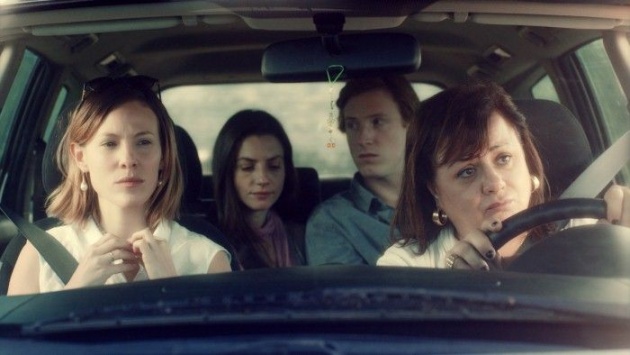
Anderswo (Anywhere Else) is an engaging comedy about family and relationships from Israeli-born co-writer-director Ester Amrami. Its themes are universal - insecurity, alienation, the need to return to the familiar, even if conversations at ‘home’ are conducted at high-decibel levels. The humour is based around cultural specificity. The last thing a Jewish grandmother, who lost her family in the Holocaust, wants is to see a German at her sick bed.
Noa Guttermann (Neta Riskin) is a Berlin-based Masters student trying to complete a thesis on untranslatable words – words or phrases that have no equivalent in other languages. Her interviews are conducted on camera – she wants to see how people use their body to express words such as ‘saudade’ (a feeling of longing, melancholy or nostalgia) or ‘stam’ (the Hebrew word for ‘just kidding, though used here as a shrug, like, whatever). Noa has a German boyfriend, Jörg (Golo Euler) who plays the trombone – or as one of Noa’s relatives puts it, ‘ah, kletzmer’ – who has the opportunity to play in Stuttgart. During a Skype chat with her family, Noa invites Jörg to join her. He doesn’t. Being pressurised to redefine her thesis – her course coordinator is critical of its quality – Noa fails to pay her course fees and heads home. In Israel, she can feel the salt on her lips, even though of course, Marguerita is not the Holy Land’s national drink.
Noa’s family respond to her ‘visit’ in different ways. Her grandmother is pleased to see her, as is her brother, Dudi (Kosta Kaplen) who is undertaking military service. Her sister is more hostile, dismissive of the young woman who left the family home – her husband abandoned her for another woman, leaving her with a child to bring up on her own. Noa doesn’t tell her family she was quit her studies. Then Noa’s mother gets a telephone call – Jörg has been detained at the airport.
There are many wryly amusing moments such as Noa’s father showing Jörg their bunker and Noa collecting her sister’s child from kindergarten – only it is the wrong kid. Jörg wants to know why Noa didn’t pay her fees – he wants to save their relationship. He forms an unexpected bond with Dudi, who drops out of the service. Jörg skinny-dips in the sea and is given his army uniform to wear. ‘He’s a UN soldier,’ Dudi explains to women who look at Jörg appreciatively. There is also an unexpected complication that keeps Noa in Israel; it gives her visit some poignancy.
Anderswo is warm-hearted and entertaining. It is partly-based on the director’s own experience, moving to Berlin. It deals with the testy relationship between a mother and a daughter, played out when Noa meets a doctor who you sense is a man she rejected in the past – Noa asks whether he still hangs out with the same (male) friends. The untranslatable words act as metaphor for the definition of cultural identity, the ways people experience the same emotions differently. We learn something about what life is like for Israels – irritation with crossing points, sadness and suspicion. There is also a moment when Noa starts making love with Jörg – there is partial nudity – and we feel a taboo is being broken. Anderswo is also about what can be learnt from mixing cultures and invites us to understand the need of the migrant to build a new home in which one can feel safe, even under grey Berlin skies.
Reviewed at Viennale 15 – the 2015 Vienna International Film Festival, Sonntag, 25 Oktober – Kino Urania. Other untranslatable words are: ‘magone’, ‘wabi, ‘sabi’, ‘toqborni’, ‘matje’ and ‘ostranienje’



